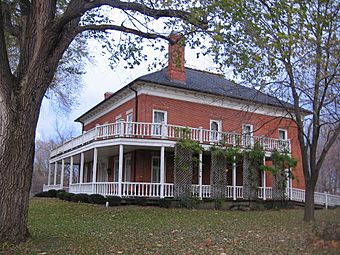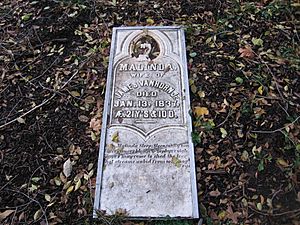Van Horn Mansion facts for kids
Quick facts for kids |
|
|
Van Horn Mansion
|
|

The Van Horn Mansion located on Lockport Olcott Road
|
|
| Nearest city | Newfane, New York |
|---|---|
| Built | 1823 |
| Architectural style | Colonial Revival Georgian |
| NRHP reference No. | 91001149 |
| Added to NRHP | September 9, 1991 |
The Van Horn Mansion is a historic house built in 1823 by Judge James Van Horn. It is located in Newfane, New York, a town in Niagara County, New York. This mansion is famous for being the place where the very first town meeting of Newfane happened on April 6, 1824.
The large house has 16 rooms and five bathrooms. It sits on Lockport-Olcott Road, also known as Route 78. The Van Horn Mansion is one of many important historical places in Niagara County that are listed on the National Register of Historic Places. Some people also believe it is haunted!
Contents
Meet Judge James Van Horn
James Van Horn was born in New Jersey. He moved north to New York around the time the famous Erie Canal was being built. In 1817, James Van Horn settled in Newfane with his nine children.
He was a busy builder and businessman. He built a gristmill, which is a mill for grinding grain into flour. In 1842, he also built the first wool mill in Niagara County. In 1821, James Van Horn became one of the first four judges in Niagara County. Two years later, in 1823, he built the Van Horn Mansion. It was the first brick home in Newfane and was built in the Georgian-style. From 1829 to 1831, James Van Horn also served as the leader of the Town of Newfane.
The Mansion's Journey Through Time
After the Van Horn family, the mansion had many different owners. The last person from the Van Horn family sold the house in 1910 to W.H. Davis. In 1922, Herbert Pease owned it.
In 1929, Douglas Patterson bought the mansion. He opened a community skating rink there for the people of Newfane. This was a popular spot until 1938. Sadly, in 1939, the mansion was damaged by a fire.
In 1949, Mary Wagner took over the mansion. She worked hard to fix it up and turned it into a fancy restaurant called Green Acres. Later, in 1959, John Strickland changed the building into apartments. Over time, the mansion was left empty and was damaged by people who broke in.
In 1987, the Noury Chemical Company bought the mansion. They then gave it to the Newfane Historical Society. The Historical Society has worked to keep the mansion beautiful and important. They have hosted special events like Victorian teas and tours. Many volunteers have helped to fix up and care for the mansion over the years.
Stories of Hauntings
The Van Horn Mansion is known for its spooky stories. In 1996, a student even created a haunted house inside the mansion. Many people who claim to be Psychics have said the building feels haunted. The Van Horn Mansion is one of several places in Niagara County and Western New York that people believe are haunted.
During renovations, roofers working on the mansion said they saw faces in the windows when no one was inside. They also saw lights flicker for no reason. Carpenters working there claimed to see spirits. The main ghost is said to be Malinda, along with a few others. Malinda was the wife of James Van Horn Jr. Her grave was once in the rose garden on the south side of the mansion grounds.
Some people have reported strange events outside too. Cars have reportedly skidded to avoid hitting a girl running from the mansion, who then vanishes. Many believe this girl is Malinda. People have also held séances there, trying to communicate with spirits, and have shared other paranormal stories. However, Malinda's remains were later moved to a small area in the backyard. After that, no more paranormal encounters were reported.
A researcher named Joe Nickell has looked into these stories. He wrote that there is no strong proof that the mansion is haunted. He believes that the strange things people saw or heard had simple, normal explanations. He also found that many stories about Malinda were different or exaggerated. In 2003, he attended some séances and found that the table-tipping events were caused by the ideomotor effect, which is when a person's unconscious movements make something happen.
Inside and Outside the Mansion
 | Anna J. Cooper |
 | Mary McLeod Bethune |
 | Lillie Mae Bradford |











